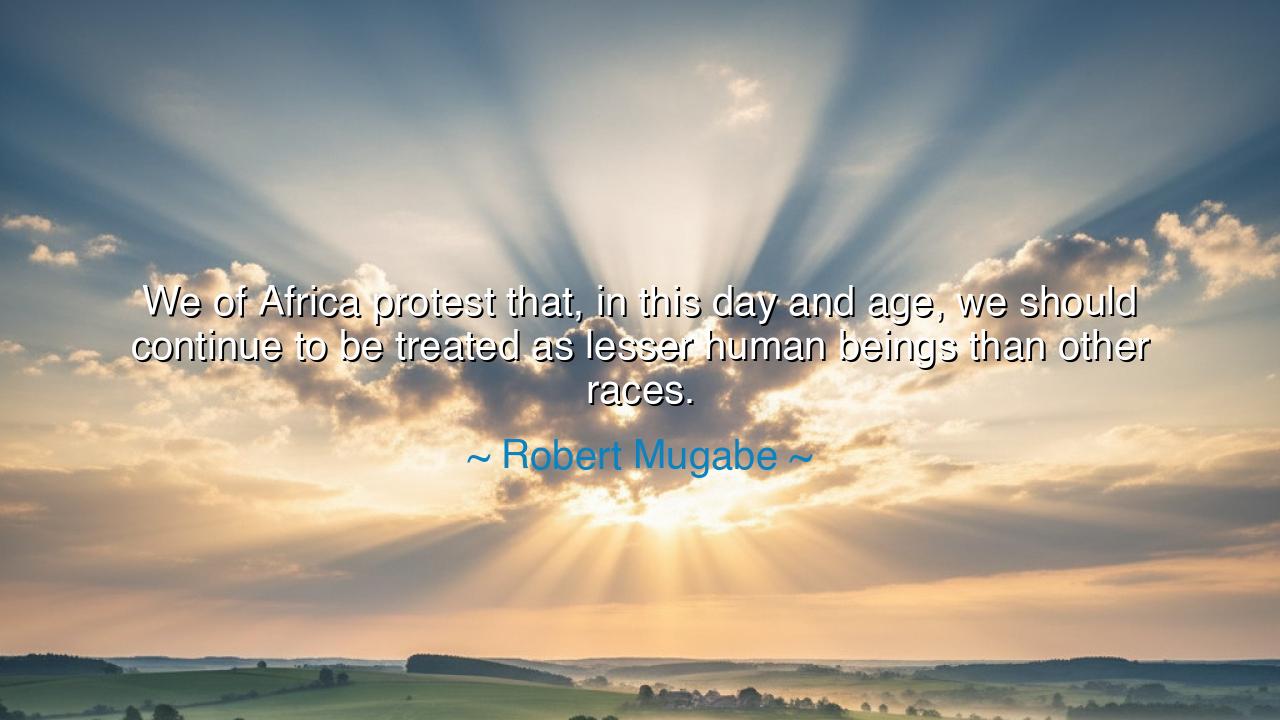
We of Africa protest that, in this day and age, we should
We of Africa protest that, in this day and age, we should continue to be treated as lesser human beings than other races.






Hear now, O children of the future, the passionate cry of Robert Mugabe, who, in the face of profound injustice, declared: "We of Africa protest that, in this day and age, we should continue to be treated as lesser human beings than other races." These words, spoken from the depths of pain and resolve, reflect the struggle of an entire continent, long silenced and oppressed, yearning for its rightful place among the nations of the world. For centuries, the peoples of Africa have been subjected to degradation, exploitation, and dehumanization, their worth denied in the face of a world that sought to keep them in shadows, as lesser beings—second-class in the eyes of many, despite the brilliance and strength of their culture, history, and spirit.
Let us, for a moment, look back upon the grand history of Africa, that cradle of humanity, where the first humans walked upon the earth. The civilizations of Egypt, Mali, Ghana, and Great Zimbabwe were once the towering giants of knowledge, wisdom, and power. The Egyptians, with their towering pyramids and profound understanding of the stars, the Mali Empire, with its wealth and learning, and the Kingdom of Aksum, with its great trade and influence—each of these empires stands as a testament to the greatness of African civilization. Yet, in the wake of colonialism, the world sought to erase the dignity of these peoples, reducing them to mere shadows of their former selves. Mugabe's words are not just a protest—they are a cry for the recognition of the injustice and inequality that still permeate the modern world.
Consider the atrocities committed during the age of slavery, when millions of Africans were stolen from their lands, shackled, and forced into servitude across the seas. These human beings, in the eyes of many, were less than human—treated as chattel to be bought and sold. Their freedom, their dignity, their very humanity were stripped away, and they were forced into lives of toil and misery. This was the foundation of the systemic oppression that Mugabe speaks of—an oppression that did not end with the abolition of the transatlantic slave trade, but which continued in the form of colonization, where Europeans carved up Africa, claiming its land, its resources, and its people as their own, all the while denying the African peoples their rightful place in the world.
In this struggle, Mugabe’s protest is not merely for the past, but for the present and the future. For even after the end of colonial rule, Africa continues to face a struggle against the structures of racism and inequality that persist today. The legacy of colonialism is not easily erased, for it lingers in the policies, the attitudes, and the systems that still undermine the potential of African nations. It is in this context that Mugabe’s words ring true: in the age of supposed equality and progress, the peoples of Africa still find themselves treated as lesser beings, as if their worth is less than that of other races. It is a shameful reality that in the modern world, even as technology and civilization advance, the dignity of African peoples remains under siege.
But the power of Mugabe’s protest is not merely in its condemnation of past wrongs; it is a call to action, a rallying cry for the peoples of Africa to reclaim their pride and identity. The history of Africa is rich with the stories of resistance, of kings and queens, of warriors and scholars who fought not just for land, but for freedom and justice. From the great Shaka Zulu, who unified vast lands with his strength and strategy, to Nelson Mandela, who stood firm in the face of apartheid and led his people to freedom, Africa has always found leaders who refused to accept the mantle of inferiority. Mugabe’s words echo this spirit of defiance and resilience.
What then, O children of the future, can we learn from Mugabe’s protest? First, we must recognize that equality and justice are not mere ideals to be whispered in the halls of power—they are truths that must be fought for, defended, and celebrated in the real world. The journey toward a just society is long, and often the road is paved with the resistance of those who would seek to preserve the status quo. But we must also remember that injustice is not just the suffering of the past—it is a living, breathing force that demands to be confronted. As Mugabe teaches us, we must never accept the notion that some are born to be less, that some are destined to suffer while others prosper. All people, regardless of their race, their history, or their origin, must be recognized as equal in dignity and worth.
Thus, O children of the future, take this lesson to heart: never allow the forces of injustice to define your worth. Whether you are born into privilege or into hardship, your humanity is sacred. Strive to empower the voices of those who are silenced, to elevate the dignity of those who are cast down. The struggle for equality is not merely a battle of words, but one of action, of living in such a way that all are treated with the respect and justice they deserve. Let the cry of Mugabe echo through the ages, and may it inspire you to rise against the forces of oppression, so that in the future, no people shall be made to feel less than human, but all shall walk side by side in the fullness of their dignity.






AAdministratorAdministrator
Welcome, honored guests. Please leave a comment, we will respond soon